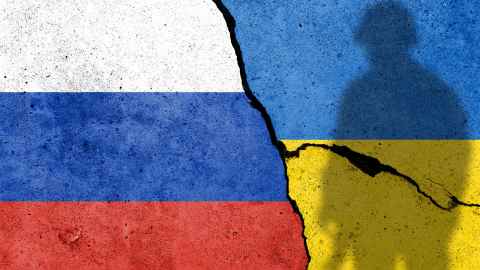Making sense of Vladimir Putin
23 February 2022
Opinion: Putin could be assessed as misguided, deluded, hyper-patriotic or criminal. But displacing him is unlikely. Stephen Hoadley explains how the West must adapt.

Vladimir Putin has kept the world guessing why he has amassed troops on Ukraine’s borders. Explanations of his motivations vary across a spectrum from history to geopolitics to political nostalgia and social pathology.
Putin's motivations stated in his public demands are 1) to push the NATO alliance farther from Russia’s borders and 2) to draw Ukraine back into Russia’s sphere of influence. Here the Russian perspectives of geopolitics and history converge.
Russia has been attacked from the west by Napoleon, Kaiser Wilhelm, then Hitler. After 1991, NATO’s expansion from West Germany during the Cold War to Russia’s Baltic borders by incorporating former USSR satellite states have shrunk Russia’s traditional security buffers. Moscow alleges that NATO is poised to expand further by inviting Ukraine and Georgia to join. Russian spokespeople assert disingenuously that NATO is preparing to attack Russia through its proxy Ukraine.
Thus Russia’s alleged right to a sphere of influence in Eastern Europe that Churchill granted Stalin at Yalta and Potsdam in 1944-45, and NATO granted Yeltsin in the 1990s in return for accepting the reunification of Germany, is ignored. Putin regards this derogation by Western leaders as bad faith, broken promises, and hypocritical expansionism.
American and European support of Ukrainian leaders’ aspirations to look west is seen by Putin as dismemberment of Greater Russia. Ukraine is regarded by sentimental Russian nationalists as integral to Russia historically, culturally, and economically. Its current independence is an anomaly artificially manipulated by Western triumphalists conspiring with Kyiv crooks and neo-fascists to dupe the Ukrainian people, in their view.
Putin’s unvoiced motivation is fear reinforced by criminal self-interest. Besides anxiety about a hostile alliance nearing Russia, Putin and his cronies fear the example of a democratic, Westward-oriented neighbour. Ukraine, since its popular Orange Revolution in 2004, contrasts starkly with Putin’s political model, which is an authoritarian, kleptocratic mafia regime controlling a heretofore obedient populace and exploiting a stagnant oil-and-gas export dependent economy.
A successful independent Ukraine offers Russians an alternative future, one without Putin and his parasitic entourage. This is intolerable to the Moscow ruling elite because it undermines its political security and requires ever-more repressive measures against progressive Russians such as Navalny and human rights leaders. So they are impelled to discredit and weaken Ukraine by harassing it politically, sanctioning it economically, and bullying it militarily. And to dismember it.
Putin is correct on one count: a quarter of Ukrainians speak Russian and many favour Russian influence. Russia’s annexation of Crimea in 2014, and now the recognition of the independence of breakaway provinces of Donets and Luhansk, are accepted by the local populations. Clandestine Russian aid to the secessionists since 2014 can now become overt, and ‘peacekeeping’ troops to maintain order will follow.
Putin has thus succeeded in separating Crimea, Donetsk, and Luhansk from Ukraine, just as he separated South Ossetia and Abkhazia from Georgia and established strategic partnerships with China, Belarus and Syria. He has reinstated Russia as a modern military power deserving of inclusion at the top tables of geopolitics, alongside the United States and China.
But has Putin over-reached? The NATO allies and their Ukrainian counterparts have not been intimidated but rather stiffened by Russia’s show of force and intervention. NATO has moved not farther but closer as US and European combat units have been deployed to Poland, Lithuania, and Romania to deter a possible Russian invasion. Severe economic sanctions of Russia led by the United States and Britain are in train.
By energising NATO and stoking Ukrainian nationalism, Putin has achieved the opposite of his aims. He has paid a cost in loss of international credibility, respect, and inclusion. Sanctions will sap his country’s economic vitality. Regrettably much of the cost will be paid by the Russian people as Putin and his henchmen continue to siphon oil and gas revenues into their overseas bank accounts while the Russian economy stagnates.
So from various vantage points Putin may be assessed as misguided, deluded, Machiavellian, hyper-patriotic, or criminal in his recent initiatives. Displacing him is not likely; the West must adapt to him while resisting his over-reach and avoiding a ruinous war. Perhaps a 21st Century version of the US-NATO Containment doctrine that held off the Soviet Union during four decades of the Cold War is emerging.
Dr Stephen Hoadley is Associate Professor of Politics and International Relations in the Faculty of Arts.
This article reflects the opinion of the author and not necessarily the views of the University of Auckland.
Used with permission from Making sense of Vladimir Putin 23 February 2022
Media queries
Alison Sims | Media adviser
M: 021 249 0089
E: alison.sims@auckland.ac.nz